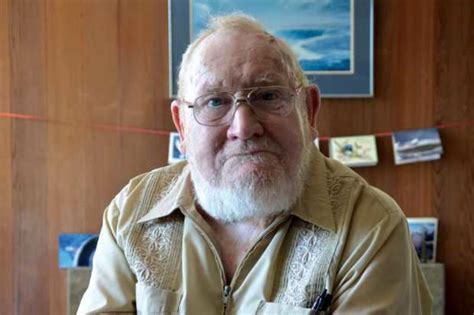A Quote by Fulton J. Sheen
His words even imply that philanthropy has deeper depths than is generally realized. The great emotions of compassion and mercy are traced to Him; there is more to human deeds than the doers are aware. He identified every act of kindness as an expression of sympathy with Himself. All kindnesses are either done explicitly or implicitly in His name, or they are refused explicitly or implicitly in His name.
Related Quotes
Much of the geographical work of the past hundred years... has either explicitly or implicitly taken its inspiration from biology, and in particular Darwin. Many of the original Darwinians, such as Hooker, Wallace, Huxley, Bates, and Darwin himself, were actively concerned with geographical exploration, and it was largely facts of geographical distribution in a spatial setting which provided Darwin with the germ of his theory.
Stalin, of course, never went on trial, but his legacy did. In 1956, three years after his death, he was denounced by Nikita Khrushchev. And his crimes were even more explicitly exposed by Mikhail Gorbachev during the late '80s. Yet to many, Stalin remains more legitimate as a Russian leader than anyone since.
The name, his true name, was weaker and more flawed than he would have liked, and he hated himself for that, but there was also much to admire within it, and the more he thought about it, the more he was able to accept the true nature of his self. He was not the best person in the world, but neither was he the worst.
In marriage for example, you say 'Yes' on the day you get married, 'I do', but each day you implicitly if not explicitly, also say 'Yes', by every act that one performs in a marriage, one is saying 'Yes', making a cup of coffee for one's wife or husband is a form of saying 'Yes' to the marriage vow that one is continuing the marriage by affirming it in one's deeds. And exactly the same in the religious life.
The wonder of an artist's performance grows with the range of his penetration, with the instinctive sympathy that makes him, in his mortal isolation, considerate of other men's fate and a great diviner of their secret, so that his work speaks to them kindly, with a deeper assurance than they could have spoken with to themselves.
Perhaps even more than constituted authority, it is social uniformity and sameness that harass the individual most. His very "uniqueness," "separateness" and "differentiation" make him an alien, not only in his native place, but even in his own home. Often more so than the foreign born who generally falls in with the established.
God has sovereignly pulled back the curtain on His glory. He has disclosed Himself on the platform of both creation and redemption that we might stand awestruck in His presence, beholding the sweet symmetry of His attributes, pondering the unfathomable depths of His greatness, baffled by the wisdom of His deeds and the limitless extent of His goodness. This is His beauty.
The name that no human research can discover-- But THE CAT HIMSELF KNOWS, and will never confess. When you notice a cat in profound meditation, The reason, I tell you, is always the same: His mind is engaged in a rapt contemplation Of the thought, of the thought, of the thought of his name: His ineffable effable Effanineffable Deep and inscrutable singular Name.





































